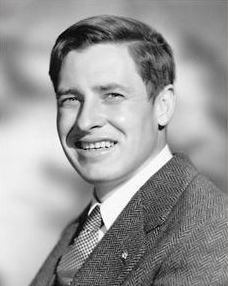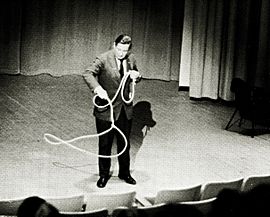Will Rogers Jr. facts for kids
Quick facts for kids
Will Rogers Jr.
|
|
|---|---|
 |
|
| Member of the U.S. House of Representatives from California's 16th district |
|
| In office January 3, 1943 – May 23, 1944 |
|
| Preceded by | Leland M. Ford |
| Succeeded by | Ellis E. Patterson |
| Personal details | |
| Born |
William Vann Rogers
October 20, 1911 New York City, New York, U.S. |
| Died | July 9, 1993 (aged 81) Tubac, Arizona, U.S. |
| Political party | Democratic |
| Spouse |
Collier Connell
(m. 1941) |
| Children | 2 |
| Relatives | Will Rogers (father) |
| Education | Stanford University (BA) |
| Military service | |
| Allegiance | |
| Branch/service | |
| Years of service | 1942–1946 |
| Unit | 893rd Tank Destroyer Battalion 814th Tank Destroyer Battalion |
| Battles/wars | World War II |
| Awards | |
William Vann Rogers, known as Will Rogers Jr. (October 20, 1911 – July 9, 1993), was an American politician, writer, and newspaper publisher. He was the oldest son of the famous humorist Will Rogers. Will Jr. served as a Democratic U.S. Representative for California. He held this position from January 3, 1943, until May 23, 1944. He then resigned to rejoin the United States Army during World War II.
Contents
Early Life and Military Service
Will Rogers Jr. was born in New York City. His father was performing there at the time. He grew up in Los Angeles, California, and went to school there. In 1935, he earned a Bachelor of Arts degree from Stanford University.
After finishing college, he became the publisher of the Beverly Hills Citizen newspaper. He worked in this role until 1953. He had been trained as a second lieutenant through the Reserve Officers' Training Corps. However, he did not immediately go into active military duty.
When the U.S. entered World War II, he joined the army as a private in June 1942. The next month, he became an officer in the field artillery. He was assigned to the 893rd Tank Destroyer Battalion.
Serving in Congress and Returning to War
While he was still in the army, Will Rogers Jr. was elected to the United States House of Representatives. He represented California and began his term on January 3, 1943. He served in the 78th United States Congress.
However, he did not finish his term in Congress. He resigned on May 23, 1944, to return to active duty in the Army.
A British government analyst named Isaiah Berlin wrote a secret report about U.S. politicians in 1943. He described Rogers as a "new-comer" to the House. Berlin noted that Rogers was a sincere young man. He strongly believed in international cooperation after the war. Berlin thought Rogers would be a strong supporter of working with other countries. He also thought Rogers might be critical of the British Empire.
After leaving Congress, Rogers was assigned to the 814th Tank Destroyer Battalion. He served in Europe during the war under General George Patton's Third United States Army. Rogers was wounded in battle and received a Bronze Star Medal. He left active military duty on March 1, 1946.
Post-War Political Career
In 1946, Rogers won the Democratic nomination to become a U.S. Senator from California. However, he lost the election in November to the senator who was already in office, William Knowland.
Rogers was a delegate to the Democratic National Convention several times. He attended in 1948, 1952, and 1956. He also served in other government roles. He was a member of the California State Parks Commission from 1958 to 1962. He was the chairman of this commission from 1960 to 1962. Later, he was a special assistant to the Commission on Indian Affairs. This was during the Johnson administration, from 1967 to 1969.
Acting Career
Will Rogers Jr. also had a short career as an actor. He was best known for playing his own father, whom he looked very much like. He played his father in the movie The Story of Will Rogers (1952). He also appeared in Wild Heritage (1958), where he played a judge. In 1982, he provided the voice for a character in The American Adventure at Disney's Epcot in Florida.
He often appeared on the 1950s television show Schlitz Playhouse of Stars. Rogers starred as "Tom Brewster" in The Boy from Oklahoma, a 1954 Western film. This movie later became the basis for the 1957 television series Sugarfoot. However, the producers of Sugarfoot chose a different actor, Will Hutchins, for the main role.
Earlier, from 1953 to 1954, he starred in Rogers of the Gazette. This was a CBS Radio series where he played a small-town newspaper owner. For one season in 1956, he hosted The Morning Show on CBS Television. He was later replaced by Jimmy Dean. He was also one of several actors who hosted reruns of the television show Death Valley Days. The episodes he hosted were called The Pioneers.
Later Years and Death
In his later years, Will Rogers Jr. retired to his ranch in Tubac, Arizona. He had several health problems, including strokes, heart issues, and hip replacements. He died in 1993 at the age of 81. He was buried next to his wife in the Tubac Cemetery. He was survived by his two sons, Clem Adair Rogers and Carl Connell Rogers, and his brother, James Rogers.
See also
 In Spanish: Will Rogers, Jr. para niños
In Spanish: Will Rogers, Jr. para niños
 | Aurelia Browder |
 | Nannie Helen Burroughs |
 | Michelle Alexander |


